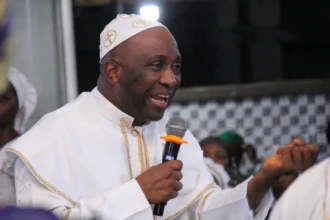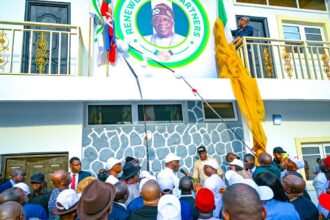 The presiding Bishop of The Redeemed Evangelical Mission (TREM), Bishop Mike Okonkwo, is one man of God who does not shy away from making comments on political issues. In this interview conducted on the sidelines of the church’s Leading Edge Conference held at the TREM Vision House, Abuja, recently, the cleric declares that marginalization and persistent underdevelopment are at the root of the increasing clamour for restructuring in Nigeria. Associate Editor, TAIWO ADISA, presents excerpts:
The presiding Bishop of The Redeemed Evangelical Mission (TREM), Bishop Mike Okonkwo, is one man of God who does not shy away from making comments on political issues. In this interview conducted on the sidelines of the church’s Leading Edge Conference held at the TREM Vision House, Abuja, recently, the cleric declares that marginalization and persistent underdevelopment are at the root of the increasing clamour for restructuring in Nigeria. Associate Editor, TAIWO ADISA, presents excerpts:
Agitation for restructuring of the Nigerian polity has become deafening in recent months. Many of the proponents present it to seem like it is the solution to Nigeria’s challenges. Can you weigh in on this with your candid opinion?
When it is the season for something, you can’t hold back the season. Like you rightly said, there has never been greater agitation for restructuring than this one. Even those who hitherto were indifferent to the issue are now beginning to touch it. That is an indication that the hour has come. I believe with all my heart that if this nation is restructured, it will help us to be creative. It will take us faster than we expected. It would make even those that are in politics become creative, because what most of them are doing is to go cap in hand to Abuja and collect money and squander it, and nothing is happening. But now, people will demand accountability and competition would be all over the place. If I have seen result in Kebbi, Sokoto and Zamfara states and I’m supposed to be in Niger and no result, I would ask my governor, ‘what is it this person doing differently that you are not doing?’ The same thing applies to the East. It will bring about real competition for development in different parts of the country. To be honest with you, I feel ashamed sometimes to answer Nigerian in the sense that this nation is highly endowed with human and material resources. We have what it takes to be a giant in the comity of nations, not just in Africa but in the world, but where are we? Other nations have moved on. I read in the newspapers that Dubai, in 2020, would not be using petrol again. In other words, their petrol stations would be shut down. What they would have would be recharge stations and the cars would be moved by electricity, and we are still talking about oil. So, there is an issue. We need to restructure. For me, anybody who refuses restructuring is an enemy of this country.
But we have seen the agitation assume different dimensions. In some cases, it seems to invite violence with secessionist advocacy in some parts, and some sections of the country issuing of quit notice to others? Can restructuring be achieved peacefully in this country?
It is possible if our lawmakers in National Assembly would give it a chance. When they say no, then there would be violence because people want it. They (the National Assembly) better soft-pedal and know that they are there to serve the people and not themselves. Once that is done, there would be no violence. No one wants war, especially if you have experienced it once. That is why I keep most of our young people who are agitating for war to ‘calm down. You don’t understand war. If you do, you will not ask for it’. Everything can be resolved at the table. In a war, you can lose everything you have in a day, everything you have laboured for from the day you were born… In a day, everything is lost! In a war, you can lose your entire family. We had that from the 1960s to 1970s and we know what it cost us. We shouldn’t do that. Let’s give peace a chance.
Does the church have any role in dousing the tension in the polity?
Of course, the church is playing a role by telling our people not to join those who are agitating for war. I do that. ‘Don’t join them. It’s not the best way to go.’ There is no nation that does not have problems. We can resolve our issues at the conference table. Let us abuse ourselves. Let us fight ourselves. When we finish, let us still come back to the table. We can still agree.
Still on restructuring, the National Assembly which could have given legal backing to that aspect in the constitution amendment through the bills on devolution of powers bill, rejected it. What does that portend?
I believe they will go back to it. There is a limit to which you can reject the people’s agitation. As long as they are rejecting it, there will be pressure groups, people will still be talking, the Biafran people will still be creating problems, and when it becomes a national issue, they would be forced to address it. So, I think the best thing to do is to not run from it. If the people in the National Assembly care for the people, why are they afraid of restructuring? What is wrong with restructuring and letting every state develop at its own pace and contribute to the centre? What is wrong in that? That was how the regions were operating before – the Western Region, Northern Region and Eastern Region – and all of them were progressing with groundnut, cocoa, coal and palm oil.
We were able to build universities. Our rails and other facilities were working. It is because we discovered oil and everyone is running to it. For me, any person in the National Assembly saying there should be no restructuring is there to service his belly; he is not serving the nation.
One of the issues thought as capable of reducing the agitation over marginalization is the call for the creation of South East Development Commission but the bill failed in the House of Representatives. Is that a missed opportunity?
That’s one of the reasons, again, for the agitation for Biafra. The South East has been marginalized. That is the truth. It has been marginalized and now, young people are coming up and saying enough is enough! I believe that restructuring will address this imbalance. Personally, I would not advocate a geographical Biafra, I would advocate a restructuring. My feeling when people raise the issue of Biafra is this: even in the mind of [Nnamdi] Kanu himself, he may not be looking for a geographical Biafra, he may be saying hey, address the imbalance, but we will pressurize you with this. And people better listen to that guy because he has crowd. Let me be honest with you, you cannot stop him. I don’t know how he pulled that off, but you must give it to him. In fact, if I had the opportunity to talk to him, my advice to him would be that he should connect with the other pressure groups…Arewa, Oduduwa… He should connect with all of them so that we can make our politicians know that the chicken has come home to roost; that they can no longer cheat and deceive the people. If you’re not ready to serve, get out of the way. That would be my own direction.
Nigeria appears to be a very religious country, yet it seems to produce leaders who do not care about the welfare of the people, who, as you put it, cheat the people. Where did we get it wrong?
Wrong teaching. That is where we got it wrong, from the pulpit. Those on the pulpit have to go back to the Bible and begin to preach the truth and complete gospel that will truly change people. What we have now is a bunch of hypocrites in the church. They tell people everything that is wrong with them without telling them how to make it right. They blend in to pretend they are Christians. So, when they now have to confront the gladiators on the frontline, their Christianity falls like a pack of cards because they did not receive the true gospel. So, we must go back to the pulpit to preach, because if the people receive wrongly, they will behave wrongly. That is what we see in the society, and I am ashamed. We have crowds in meetings, in programmes, but where is the effect on our society? The effect is not there. No development. The purpose of speaking in tongues is to be empowered, to impact society. But it is not there because the people are taught the wrong things. So, that is what we are facing in our nation. The church has failed in that area. But I believe that the church leaders are beginning to realise that and they are trying to address it from their different pulpits. In the next few years, we will begin to get the result we expect in our nation.







